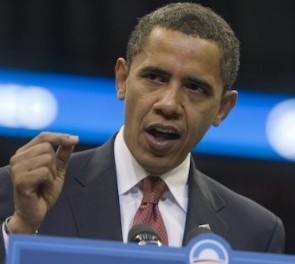 Claremont, CA. When Barack Obama was elected, just over a year ago, nobody predicted that his big problem in office would be talking to the American people.
Claremont, CA. When Barack Obama was elected, just over a year ago, nobody predicted that his big problem in office would be talking to the American people.
Back then, you might remember, he was accused all the time of being a talker: talking too much and talking too well. He’s “all talk,” said the Clintons. He lives in a “cloud of rhetoric,” said Sarah Palin. Sure, he can talk, people said, but can he make things happen?
Who could have imagined that by the time the President’s second State of the Union rolled around, everyone would be talking about how Obama, in office, has failed to talk to us? But that is where we are now.
Obama has turned out to be masterful at launching policies but inept at selling them to the American people, as Doyle McManus points out. “Take the $787-billion economic stimulus plan that Obama muscled through Congress as his first item of business in February. It was big, bold and ambitious — but in political terms, it’s been a failure. Most economists say the stimulus has saved at least half a million jobs, but Obama hasn’t convinced most voters that the impact is real.”
“He has failed to persuade most of us to support his major proposals,” says Michael Barone.
The administration’s failure to communicate has gotten so pronounced that in today’s LA Times, the great political scientist Jim Morone resorts to reminding Obama that speech matters. “Programs do not make great Presidents,” he writes. “Stories make great Presidents”:
Parties prosper when they connect their passions and their principles to their policies. Remembering that could save healthcare reform — and the Democratic majorities in the House and Senate. Forgetting it makes the majorities irrelevant, even if they manage to hang on to them.
The conventional wisdom in Washington has long been – and I’d be willing to bed that a lot of people told this to the President when he got elected – that you can’t run a country like you run a campaign. Campaigns are about talking, and government is about doing. Campaigns are about promising, and government is about delivering.
The Obama administration, which I’m sure is filled with people who have wanted to prove their early critics wrong by proving that theirs is an administration of substance, seems to have embraced this way of thinking. They’ve been heavy on the details and light on dialogue. They have turned to “experts” and away from explanation.
It is a remarkable error, since what the conventional wisdom gets wrong – and what the Obama administration is getting wrong as a result – is that talking is a critical part of doing. Speeches are a form of action.
That’s a truth that Obama thrived on as a candidate. American voters understood that, too, whether or not anyone put it into words at a time. Obama’s critics had to go after his speaking – to accuse him of being “all talk” – precisely because he is such a talented speaker, and a talented speaker is a powerful and threatening thing.
Speech can inspire people. Speech can persuade people. Speech can connect people. Speech can move people, or call us to our better selves. Speech can teach people.
Speech can corrupt people, too, as the ancient Greeks well knew. Socrates was “all talk,” after all. One thing you can say for sure about the Athenian Assembly’s vote to convict that old philosopher: at least they understood the power of speech.
Good speaking is an especially valuable commodity in contemporary American culture, and a commodity not to be wasted by a President who possesses it, because it is such a rarity here. We don’t train people how to talk well; I am hard-pressed to find any state except Texas which requires that public speaking be taught in high school. None of the major gatekeeping educational tests – the ACT, GRE, LSAT, PSAT, SAT – measure facility in oral communication. And in our everyday lives, we increasingly rely on forms of communication, from e-mail to text messaging to “chatting,” that involve the written rather than the spoken word.
The costs of this neglect are substantial in the public sphere, of course. We get lots of shouting and haranguing, but very little good argument. (Someone should tell the self-appointed “deliberative democrats” in political science that if they really believe in the power of deliberation, they should stop trying to set up complicated institutional mechanisms for bringing people together in a room – and concentrate first on teaching people how to use their mouths to convey their ideas effectively.)
In the classroom, I see the costs of this neglect of speech training all the time: I have many students who claim to be uncomfortable speaking in class, but almost none who claim to be uncomfortable writing. Apparently, my students are not alone. A recent report by some linguistic professors suggests that teenagers are becoming “unemployable” because they lack speaking skills. The report seems to blame television for that dire state of things; I blame an entire system that neglects to school people in talking.
In any case, even though we live in a culture where good speaking is so rare – maybe because we live in a culture where good speaking is so rare – good speaking remains a powerful thing. It is a form of action that retains its power to awe and transform. And it is a form of action that is distinctively human: spoken, not written, language is the capacity shared across all known human societies. Speaking is humanizing.
One of the enduring truths of political life is that people never want to be governed by a policy alone. They want to be governed by other people, by another person: a person who works hard to understand others and to make himself understood. Speech is key to those efforts.
Obama is suffering because whether or not it is true, he seems not to understand what is going on around the country. Whether or not it is true, he seems uninterested in making his proposals understood. As a result, he seems distant – the kind of guy who doesn’t really get you as a person – and the first thing that he must use to bridge that seeming distance is speech.
What the American people need now – and what the President needs – is more talk, not less.




12 comments
Siarlys Jenkins
I found this rather interesting…
http://www.nytimes.com/2010/02/12/us/politics/12poll.html?hp
It seems that while the public is down on just about everyone in public office, they are down less on President Obama than on Democrats in congress, and trust Republicans even less than that. Also, citizens who are self-conscious Republicans blame their own party for failure to put the country ahead of partisan interest. So Obama has something to work with.
Herb Klein wrote in Time magazine some time back that Obama had managed to win an election without insulting the intelligence of the American voter. I think that is true, and I think voters still give him some credit for it. At the beginning of 2008, the would-be populist of the year, John Edwards, said “you have to fight those people” (the nebulous ones with their hands on the levers), and candidate Barack responded “So what you’re saying is, Obama is too nice.” Well, in fact he is, and too accommodating of conventional wisdom. He may have to let JP Morgan Chase’s campaign donations go back to the Republicans, and good riddance. Let the GOP collect the thirty pieces of silver, but give us Glass-Steagall back before its too late.
D.W. Sabin
We are dealing with High-Falutin Reformist Tinkering here folks, another round of best intentions before last call. Perhaps one of these dark nights, the great orators will finally wake up to the evil stew they have simmering and abandon the premises like the fleeing tenants of so called “under-water” mortgaged homes. Abandonment, after all, is the growth industry of the coming age. Keep an eye peeled for the junkyard dogs, they will be numerous.
If there was any hope that this gouty lapsed-republic might settle into post-top dog status in a civilized manner, we might have a better quality of satire demonstrating the novel idea that some of us might actually understand the dark comedy of what is going on. The best we can do is a duo of late night faux-news casts which are indeed funny but hardly Swiftian. Needless to say, the Brits could rely on her fellow anglo-saxons to assume the mantle of precious “indispensability”, thus maintaining hospitable conditions overall. Looking around, China is set to pass Japan as the second largest economy sometime this summer and as best as I can tell, they have a tin ear when it comes to literary qualities of satire . Something in their atonal music tends to the staccato.
Pete Peterson
As one of the few who actually makes his living as a “deliberative democrat”, I can say that the President’s problem is one of the most unique in American history: he has extremely high “personal approval” ratings matched with mediocre and declining “policy” ratings. Here is a presidency that is failing almost purely on its policy recommendations.
In part, this has little to do with his ability to communicate these policies. When are our President and many left-leaning pundits going to realize that on initiatives from nationalized (though not single-payer) to cap-and-trade, this Administration (along with a left-leaning Congress) is bumping into one of the deepest sentiments in American life: “Don’t tread on me”.
At the same time, the President is couching this in “post-partisan”, “non-ideological” rhetoric. Harvey Mansfield’s recent piece in the Weekly Standard on this is a powerful indictment of our President’s resorting to so-called “pragmatism”, which obfuscates the important difference between “outcomes” and “principles”. “Just bring me a good idea, and I’ll put it work”, he says…really?
Bruce Smith
I’m really very skeptical about Obama The Changeling being let into the Great Marxist Hall of Fame until he’s stopped the Vampire Squid Banks of Wall Street manufacturing credit to create the speculative financial bubbles which they love to burst to give us our wonderful recessions! I’d love to be wrong about it but I don’t think he has the insight or the will and anyway the Supreme Court seems to have time limited him!
Stephen
One can tell what a sad state the art of American public speaking is in by the fact that so many Americans think President Obama is a good public speaker.
John Willson
Pundits used to delight in W’s pronunciation of “terrorist.” Listen carefully to the way Mr. Obama clips off words, and gets away with it. Michael Medved pointed out another truth that admirers of Mr. Swivel Head’s speeches almost always ignore: one has to listen to them.
Susan, your comments on teaching public speaking in the schools brings up a very important thing. Declamation and recitation, part of learning rhetoric, used to be an integral part of the liberal arts, and it extended down to the beginning of New England schoolhouses. The private academy that is part of our College asks the children to memorize poems and short pieces to recite before the entire school at assembly beginning in first grade. By the time they are ten or twelve even the shy ones are confident enough to read in church, recite in class, and be interviewed on the radio.
An important thing to remember, though, is that in our government schools they would probably be taught to recite and declaim the wrong things.
Bob Cheeks
Susan, I loved this, “The conventional wisdom in Washington has long been – and I’d be willing to bed….” but not being a Freudian we’ll let it pass!
Re: He-Who-Knows-the-Light I think his main problem is that the moribund American people have finally determined that he’s a radical socialist (of whatever stripe) and his programs (pogroms) don’t work and consequently a whole lot of ’em are outta work. Bubba was right…it is, indeed, the economy!
Susan, we live in a right-center country, or at least the talking heads say we do, and he’s way to far left…even the state sponsored media is beginning to mock him, never a good sign for a Democrat. Also, following the infamous “Cambridge” incident he’s lost the blue collar white vote. Then there’s the recent Taxechewsetts election and his “unprecedented” assault on the SCOTUS during the SOTU address! None of this is good and it’s always possible that he may rise up and smite the right but….well we’ll just have to see.
Jeff Taylor
Susan, I’m not sure that Obama’s problem is a lack of talking to the American people. He’s overexposed, in my view. Way too much television, which dilutes his persona and reinforces the impression of megalomania. I think it’s a problem of quality, not quantity.
You nail it when you say Obama “seems distant – the kind of guy who doesn’t really get you as a person.” But more speech is not going to help because he seems distant even when he is talking to us. There’s a certain aloofness, coolness, arrogance, condescension, that he emotes. A little like Al Gore. Some people call it “professorial,” although I don’t speak like that to my students and I doubt that you do either. Plus, the American people are not students. We are citizens.
I’ve always thought that Obama’s skills as a speaker were overrated. I’ve suspected that the glorification of his speaking was partly unconscious racism coming from liberal whites who were amazed that a black man could be so “articulate” (not to mention clean, in Joseph Biden’s classic formulation). He uses standard English. He enunciates clearly. He is professorial. Gasp. Swoon.
I’ve never found his style to be compelling. It’s too stilted and cold for my taste, but maybe that’s personal preference. The problem for Obama is that he’s not making an emotional connection with most Americans. Partly because he’s speaking so much…in the wrong way. People notice his reliance on the teleprompter, the gaffes when he is not using a script, the self-absorption. (“I don’t quit!” Yes, he said this after saying, “We don’t quit!” but you get the sense that it’s really all about Obama and his special mission. The rest of us have parts to play in The Barack Obama Story.) In a way, it’s a nice twist: The difficulties of an elitist trying to sound like a genuine populist. Obama is trying and failing.
rufus
I think there’s a suspicion of honeyed speech these days. Certainly, the people who founded the country would have thought first of Cicero as a model for political rhetoric, while we’re as likely to think of totalitarian propagandists. I think we’re now troubled by the uncanny quality of stirring rhetoric- it’s ability to hypnotically lead populations astray. The twentieth century gave plenty of reasons to be skeptical. But listening to public figures- politicians, celebrities, journalists, even educators- constantly speaking in crude banalities is like soaking in lye on a daily basis.
eutychus
Reading political articles and reviewing the resulting discourse always depresses me. It’s pretty simple folks:
A HOUSE DIVIDED CANNOT STAND.
As long as the American public is self-righteously polarized and henpecks and hogties the “enemy” arm into paralysis, the house will continue to crumble. Say bye bye to the American Empire.
Russell Arben Fox
It was a good speech–not a great speech, and with not nearly enough emphasis upon the larger civic reality that is really central to any decent argument for the way he’s trying to do things (not to mention exactly what he’s trying to do), but not bad. Unfortunately, SOTU addresses have long since been ritualized in presidential worship sessions and flourished presentations of legislative laundry lists; it probably was too much to expect that even the finest public speaker to break out of that calcified formula.
Comments are closed.